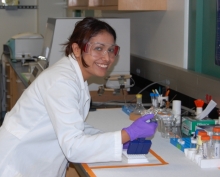
Major:
Mentor(s):
Faculty Sponsor(s):
Faculty Sponsor's Department(s):
Project Title:
Project Description:
Cationic liposome (CLs) are attractive candidates for non-viral gene delivery and are widely used in clinical trials as a delivery platform. Newly synthesized multivalent cationic lipids (CMVLns) specifically designed to be used as gene delivery carriers are capable of transfecting a large amount of DNA into mammalian cells. The CMVLns contain positively charged headgroups that interact spontaneously with the negatively charged DNA to form cationic liposome-DNA (CL-DNA) complexes. In addition, the lipid contains a degradable disulfide bond that is specifically designed to release the DNA inside the cell by being susceptible to the reducing milieu of the cytoplasm. In this study, we assessed the stability of these lipids in solution at physiological temperature (37?C), under air, for at least 6 hr, the time CL-DNA complexes are normally incubated with mammalian cells during DNA transfection experiments. Using ethidium bromide (Et-Br) displacement assay, we estimated the head-group charges in aqueous solution and also assessed the stability of CL-DNA complexes in a temperature dependent manner at different time intervals. The data showed stability up to 48 hr for CMVL5 (+5) compared to the non-degradable analogue (MVL5) and CLs at room temperature (control). In addition, we performed cytotoxicity assays to measure the membrane integrity of mammalian cells in the presence of CMVLns. The data showed that up to 86% of the mouse L-cells survived in the presence of high cationic lipid/DNA charge ratio of 10 and 15 for CMVL2 and CMVL3. Based on these results, we concluded that the degradable CMVLns lipids are not only stable at physiological temperature in air for up to 48 hr but demonstrate low cytotoxicity effects in mouse L-cells. Our results show that these lipids are promising candidates for nucleic acid delivery in gene therapy applications and can be safely used in biological conditions with high stability and low toxicity characteristics.
